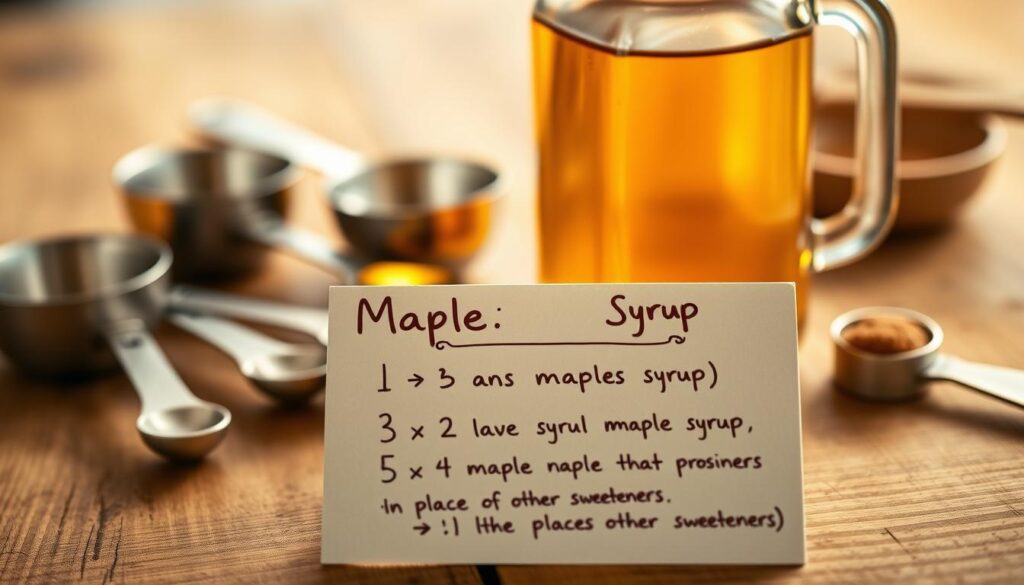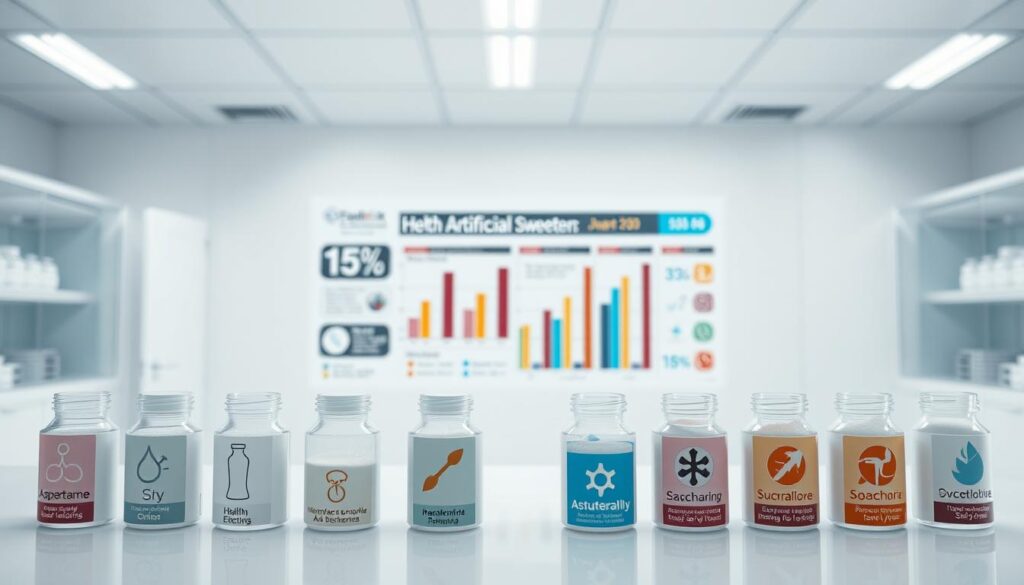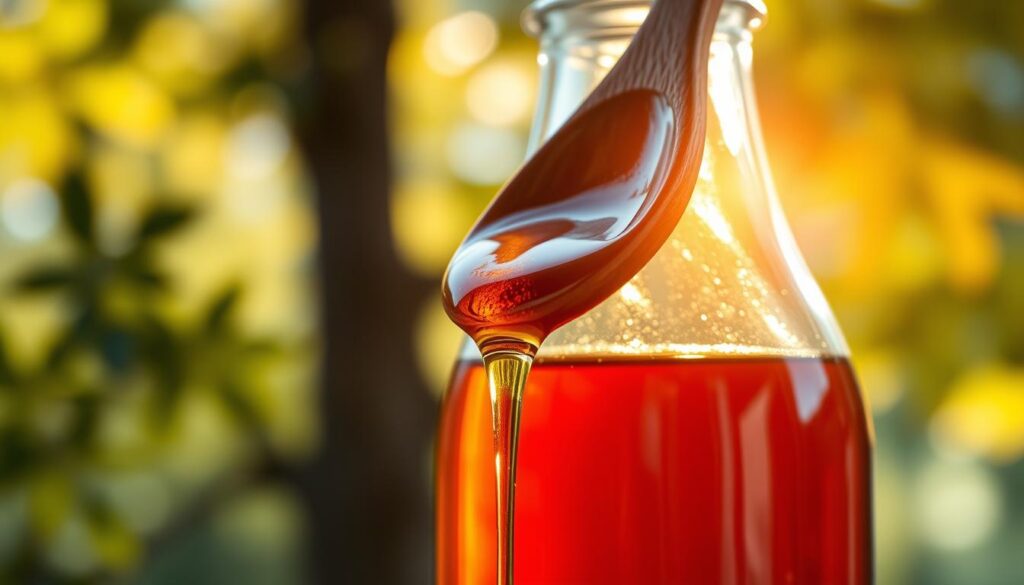In today’s world, people want natural foods instead of processed ones. Maple syrup is a top choice, being tasty and good for you. It’s more than just a sweetener; it’s packed with health benefits.
More and more, people are choosing maple syrup over artificial sweeteners. It tastes real and is better for you than chemical substitutes. In places like Vermont and Quebec, maple syrup is made the old way, keeping it healthy.
Maple syrup is special because it has minerals, antioxidants, and nutrients. It’s a better choice than artificial sweeteners. Every bit of it connects us to old ways of making food and caring for the land.
Nutrition experts say maple syrup is a smart choice for sweetening. It doesn’t raise blood sugar as much as regular sugar. So, it’s good for those who want to eat naturally and stay healthy.
As people learn about artificial sweeteners’ downsides, maple syrup shines. It’s pure and has lots of flavor and nutrients. It’s perfect for those who want to eat more natural foods.
Understanding Natural vs. Artificial Sweeteners
The world of sweeteners is complex and diverse. Natural and artificial options have big differences. Unprocessed sugars have unique nutritional profiles, unlike synthetic alternatives. People are looking for healthier sweeteners that taste good and might be good for them.
Artificial sweeteners are made in labs to taste like sugar but have no calories. They are very sweet but offer little to no nutrition.
Common Types of Artificial Sweeteners
- Aspartame (NutraSweet)
- Sucralose (Splenda)
- Saccharin (Sweet’N Low)
- Acesulfame potassium (Ace-K)
The Chemistry Behind Natural Sweeteners
Natural sweeteners like maple syrup are a better choice than processed sugars. They have complex molecules that work differently in our bodies than artificial sweeteners.
| Sweetener Type | Glycemic Index | Nutritional Value |
|---|---|---|
| Maple Syrup | 54 | Rich in minerals |
| Artificial Sweeteners | 0 | Minimal nutrition |
| White Sugar | 65 | No significant nutrients |
Impact on Blood Sugar Levels
The way sweeteners affect blood sugar levels is different. Unprocessed sugar sources like maple syrup release energy slowly. This prevents the blood sugar spikes seen with refined sugars and artificial sweeteners.
Nutrition experts suggest choosing natural sweeteners. They offer flavor and health benefits. Maple syrup is a great choice for those who care about their health.
The Historical Significance of Pure Maple Syrup
Pure maple syrup has a long history, starting with Native American cultures in North America. They were the first to figure out how to collect and turn maple sap into syrup. Their early methods set the stage for a beloved tradition in cooking.
Long before Europeans came, tribes like the Algonquin and Iroquois knew how to make maple syrup. They made cuts in trees and used logs to collect and boil the sap. This syrup was not just tasty; it was also a vital source of nutrition during cold winters.
- Indigenous peoples first discovered maple sap extraction techniques
- Traditional methods involved primitive but effective tools
- Maple syrup served both nutritional and cultural purposes
When Europeans arrived, they learned from Native Americans and made maple syrup a big deal. By the 1800s, it was a key product in places like Vermont, Quebec, and Ontario. Families would come together to collect sap and make syrup during “sugaring season.”
Maple syrup was more than just sweet. It was a link to the land and showed the value of sustainable farming. Today, sugarmakers keep these old ways alive, making sure each syrup drop has a deep history.
Nutritional Profile of Maple Syrup
Maple syrup is more than just a sweetener. It’s packed with nutrients and antioxidants. Sugarmakers use traditional methods to keep these health benefits alive.
Essential Minerals and Vitamins
Maple syrup is full of good stuff. It has minerals and vitamins that are great for you. Here are some of them:
- Manganese: Supports bone health and metabolism
- Zinc: Boosts immune system function
- Riboflavin (Vitamin B2): Aids in energy production
- Calcium: Promotes strong bones and teeth
- Potassium: Helps regulate heart function
Antioxidant Properties
Maple syrup is special because of its antioxidants. Quebecol, found only in maple syrup, fights off cell damage. Studies show it may reduce inflammation and improve health.
Caloric Content Comparison
| Sweetener | Calories per Tablespoon |
|---|---|
| Maple Syrup | 52 |
| Honey | 64 |
| White Sugar | 49 |
| Agave Nectar | 60 |
Maple syrup has calories similar to other sweeteners. But it’s much more nutritious. Enjoy its taste and get the health benefits it offers.
Why Maple Syrup is a Healthier Alternative to Artificial Sweeteners
Choosing maple syrup over artificial sweeteners is a smart move for your health. It’s a real food ingredient that beats processed sugar substitutes. These substitutes often have synthetic chemicals.
Maple syrup is a natural sweetener with many benefits:
- It has essential minerals like zinc and manganese
- It offers antioxidants for better cellular health
- It has a richer flavor than artificial sweeteners
Maple syrup is special because it comes from tree sap, not labs. Sugarmakers use traditional methods to make it. This keeps its natural qualities intact.
Nutritionists say maple syrup is better than artificial sweeteners because it:
- Has minerals not found in synthetic sweeteners
- Has a lower glycemic index than refined sugar
- Provides natural sweetness without artificial additives
Moderation is key when adding sweeteners to your diet. Maple syrup is a nutritious choice for those who prefer natural sweetness.
The Science Behind Maple Syrup’s Low Glycemic Index
Knowing the glycemic index of foods is key for keeping blood sugar healthy. Maple syrup is a standout natural sweetener. It has unique metabolic properties that differ from artificial sweeteners.
Maple syrup’s Low Glycemic Index offers big metabolic benefits. It’s not like refined sugars. This natural sweetener lets you enjoy sweetness without quick blood sugar spikes.
Blood Sugar Response Studies
Research shows maple syrup’s glycemic impact is interesting. It has a more gradual effect on blood glucose levels than regular sugar.
- Slower glucose absorption rate
- Reduced insulin response
- Sustained energy release
Metabolic Benefits
The Low Glycemic Index of maple syrup means real health perks. Studies point to benefits for weight management and metabolic health.
| Sweetener Type | Glycemic Index | Blood Sugar Impact |
|---|---|---|
| Refined Sugar | 65-70 | Rapid Spike |
| Maple Syrup | 54 | Moderate, Gradual |
“Maple syrup represents a smarter choice for those seeking a natural sweetener with metabolic considerations.” – Nutrition Research Institute
Choosing maple syrup with its Low Glycemic Index is a smart pick. It’s a delicious sweetener that helps manage blood sugar better.
Environmental Benefits of Choosing Maple Syrup

Maple syrup is a standout choice for those looking for a sustainable sweetener. It has many environmental benefits. The way it’s made supports complex forest ecosystems and offers big ecological advantages.
Maple forests are key to environmental conservation. They do this in several important ways:
- Carbon Sequestration: Mature maple trees absorb a lot of carbon dioxide from the air.
- Biodiversity Protection: Maple forests are homes to many plants and animals.
- Soil Conservation: The roots of maple trees help prevent soil erosion and keep the forest floor stable.
The process of making maple syrup is very eco-friendly. Sugarmakers use careful methods to harvest the sap without harming the trees. This way, they help keep the maple groves healthy for future generations.
Maple syrup has a much lower carbon footprint than artificial sweeteners. Its production needs little processing and uses less energy. It also supports local farming and ecosystems.
“Choosing maple syrup isn’t just a culinary decision—it’s an environmental statement.” – Sustainable Agriculture Research Institute
Maple forests act as natural carbon sinks, helping to stabilize the climate. Each acre of maple woodland can capture 2-5 tons of carbon every year. This makes maple syrup a smart choice for those who care about the environment and their health.
How to Select and Store Pure Maple Syrup
Choosing and keeping pure maple syrup right is key. It’s not just about taste. It’s about keeping its quality and health benefits.
When picking maple syrup, know its special traits and grading. Sugarmakers work hard to make each bottle the best natural sweetener.
Maple Syrup Grading Explained
The grading system shows the syrup’s color and taste. Each grade has its own Pure Maple Syrup Benefits:
- Golden Color, Delicate Taste: Lightest grade, great for a little sweetness
- Amber Color, Rich Taste: Classic maple flavor, the most loved
- Dark Color, Robust Taste: Strongest maple flavor, best for baking
- Very Dark Color, Strong Taste: Intense flavor for bold recipes
Storage Best Practices
Storing maple syrup right keeps its benefits and quality. Here’s what experts suggest:
- Refrigerate after opening to stop spoilage
- Keep the sealed container away from sunlight
- Use within a year of opening for the best taste
- Check for crystals or bad smells before using
Learning these tips helps you enjoy maple syrup’s natural sweetness. And you get to enjoy its amazing health benefits too.
Cooking and Baking with Maple Syrup: Conversion Guide

Using maple syrup in recipes changes things. It adds depth and richness to dishes, making them healthier than those with refined sugars.
When using maple syrup, there are a few things to keep in mind:
- Reduce liquid ingredients by about 1/4 cup for every cup of maple syrup used
- Lower oven temperature by 25 degrees Fahrenheit to prevent over-browning
- Use 3/4 cup of maple syrup for every 1 cup of granulated sugar
Maple syrup’s flavor is special. It’s great for baked goods, marinades, and breakfast dishes because of its caramel-like taste.
| Sugar Type | Maple Syrup Conversion | Liquid Adjustment |
|---|---|---|
| Granulated Sugar | 3/4 cup per 1 cup sugar | Reduce liquid by 1/4 cup |
| Brown Sugar | 3/4 cup per 1 cup sugar | Reduce liquid by 1/4 cup |
| Honey | 1:1 ratio | Minimal liquid adjustment |
Experts say to start small when trying maple syrup in recipes. Small changes help keep the recipe’s original taste while adding maple syrup’s special flavor.
Pro tip: Grade A maple syrup is best for baking. It has a milder taste than the darker, stronger Grade B.
Debunking Common Myths About Natural Sweeteners
Unprocessed sugar has been misunderstood for a long time. This has led to wrong ideas about its health benefits. Many people believe old myths about natural sweeteners, like maple syrup, which need to be looked at closely.
Nutrition experts have worked hard to clear up these myths. Here are some common ones:
- Natural sweeteners are the same as refined sugars
- All unprocessed sugars have the same health effects
- Maple syrup doesn’t offer any health benefits
- Natural sweeteners always raise blood sugar levels
Scientific Evidence and Research
New studies have debunked these myths. Scientists found that maple syrup has special compounds not seen in regular sugar.
“Natural sweeteners like maple syrup offer more than just sweetness – they provide trace minerals and antioxidants,” states Dr. Emily Rodriguez, nutritional biochemist.
Expert Opinions
Nutrition experts suggest choosing natural sweeteners over processed ones. They say these alternatives can be healthy when eaten in the right amounts.
| Myth | Scientific Fact |
|---|---|
| Natural sweeteners are unhealthy | Contain beneficial minerals and antioxidants |
| All sugars are chemically identical | Unique molecular structures with different metabolic impacts |
| No nutritional value | Provide trace minerals like zinc and manganese |
Knowing the truth about natural sweeteners helps people make better food choices. This supports their health and wellness goals.
Health Risks Associated with Artificial Sweeteners

Artificial sweeteners have sparked debate in nutrition science. They are seen as a healthier option than maple syrup. But, these synthetic compounds pose serious health risks that people need to know about.
Studies have found long-term use of artificial sweeteners can be harmful. Many research papers show they might harm our metabolism and gut health.
- Disruption of gut microbiome balance
- Potential insulin resistance development
- Increased risk of metabolic syndrome
- Possible neurological impact
Metabolic experts say artificial sweeteners can cause unexpected effects. The body may react differently to these synthetic compounds than to natural sugars. This could lead to unwanted metabolic problems.
“Artificial sweeteners are not the magic solution many believe them to be” – Dr. Robert Lustig, Endocrinologist
Research shows artificial sweeteners can mess with our body’s natural sugar handling. This could make it harder to manage weight and lead to metabolic issues. Maple syrup might be a better natural choice.
New studies suggest natural sweeteners like maple syrup are safer than artificial ones. They offer health benefits without the risks of synthetic compounds.
Sustainable Production Methods of Maple Syrup
Maple syrup production has become a leader in sustainable sweetener making. Modern sugarmakers have updated old ways of harvesting. They use new technologies that help protect forests and make production more efficient.
The journey to making sustainable maple syrup starts with taking care of the forest. Maple producers pick trees carefully to keep the forest healthy and growing. They do this by:
- Selective tree identification
- Minimal invasive tapping techniques
- Rotation of tapping areas
- Preservation of forest biodiversity
Being energy-efficient is key in making maple syrup sustainably. Sugarmakers have come up with better ways to boil down sap. Reverse osmosis technology and systems that reuse heat cut down on wood and fossil fuel use.
Reducing waste is also important in making maple syrup. Producers find new uses for what they can’t use. Maple wood chips are turned into biofuel, and unused sap is used in farming.
Maple syrup producers show that making sweeteners sustainably can help both the environment and local economies. They prove that caring for the planet and supporting local communities can go hand in hand.
Economic Impact of Choosing Natural Sweeteners
Choosing real food ingredients like maple syrup has a big impact on rural communities. The maple syrup industry is more than just a sweetener. It’s a key economic driver for farming areas, mainly in the northeastern United States.
Rural areas see big benefits from maple syrup production. This includes:
- Job creation in farming and processing sectors
- Tourism growth around maple farms
- Keeping traditional farming alive
- Helping local economies grow in a sustainable way
Small maple syrup makers bring in a lot of money. In places like Vermont and New York, they add millions to local economies every year.
| State | Annual Economic Impact | Jobs Created |
|---|---|---|
| Vermont | $330 million | 3,200 |
| New York | $250 million | 2,500 |
| Maine | $160 million | 1,800 |
“Supporting local maple syrup producers isn’t just about great taste—it’s about sustaining rural economic ecosystems.”
Choosing natural sweeteners is part of a bigger economic change. It helps local farmers, keeps traditional skills alive, and supports sustainable farming.
Conclusion
Maple syrup is a great choice over artificial sweeteners. It’s not just tasty but also good for you. People looking for natural sweetness can choose maple syrup, made from maple tree sap.
Choosing maple syrup is more than just a health choice. It helps the environment and supports local farmers. It’s a way to eat well and care for the planet at the same time.
Maple syrup is special because it’s both old and backed by science. It’s good for your blood sugar and packed with minerals. Experts say to use it in moderation, but it’s worth it for its health benefits.
Choosing maple syrup shows you care about your health and the planet. It makes food more enjoyable and healthy. Try maple syrup and see how it can change your meals for the better.



